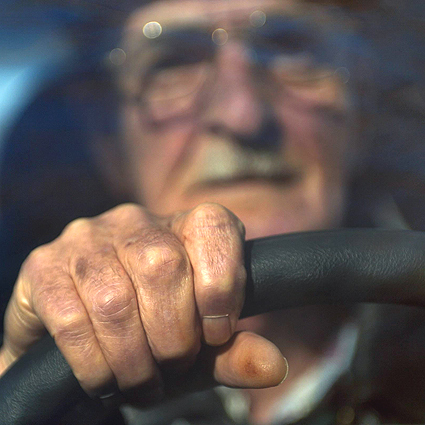Dear Savvy Senior,
Is it safe for seniors with dementia to drive, and if so, when should they stop? My dad has early Alzheimer's disease but still drives himself around town just fine.
--Looking Ahead
Dear Looking,
While most doctors agree that people with moderate to severe dementia should not take the wheel, in the early stages, the medical consensus is that driving performance should be the determining factor of when to stop driving, not the disease itself.
With that said, it's also important to realize that as your dad's driving skills deteriorate over time from the disease, he might not recognize it. So it's very important that you work closely with him and his doctor to monitor his driving. Here are some tips that can help.
Warning Signs
The best way to keep tabs on your dad's driving is to take frequent rides with him watching out for key warning signs. For example: Does he have trouble remembering routes to familiar places? Does he drive at inappropriate speeds, tailgate or drift between lanes? Does he react slowly or make poor driving decisions? Also, has your dad had any fender benders or tickets lately, or have you noticed any dents or scrapes on his vehicle? These, too, are red flags.
If you need some assessment help, hire a driver rehabilitation specialist who's trained to evaluate older drivers. To locate a specialist see driver-ed.org or aota.org/older-driver.
Transition Tips
Through your assessments, if you believe it's still safe for your dad to drive, you may want to start recommending some simple adjustments to ensure his safety, like driving only in daylight and on familiar routes, and avoiding busy roads and bad weather. Also, see if he will sign an Alzheimer's "driving contract" that designates someone to tell him when it's no longer safe to drive.
In addition, you should also consider getting a GPS vehicle tracking system for his car (like motosafety.com or mobicopilot.com) to help you keep an eye on him. These devices will let you track exactly where he's driving, and allow you to set up zones and speed limits that will notify you via email or text message when he exits an area or arrives at a designated location, and if he's driving too fast.
Time to Quit
When your dad's driving gets to the point that he can no longer drive safely, you'll need to talk to him. It's actually best to start having these conversations in the early stages of the disease, before he needs to quit driving, so he can prepare himself.
You also need to have a plan for alternative transportation (including a list of family, friends and local transportation services) that will help your dad get around after he stops driving.
For tips on how to talk to your dad, the Hartford Financial Services Group and MIT AgeLab offers a variety of resources at safedrivingforalifetime.com.
Refuses To Quit
If your dad refuses to quit you have several options. First, suggest a visit to his doctor who can give them a medical evaluation, and "prescribe" that he stops driving. Older people will often listen to their doctor before they will listen to their own family.
If he still refuses, contact your local Department of Motor Vehicles (DMV) to see if they can help. Some states require doctors to report new dementia cases to the DMV, who can revoke the person's license.
If all these fail, consider hiding his keys or just take them away. You could also disable his vehicle, park it in another location so he can't see it or have access to it, or sell it.
Send your senior questions to: Savvy Senior, P.O. Box 5443, Norman, OK 73070, or visit SavvySenior.org. Jim Miller is a contributor to the NBC Today show and author of "The Savvy Senior" book.

